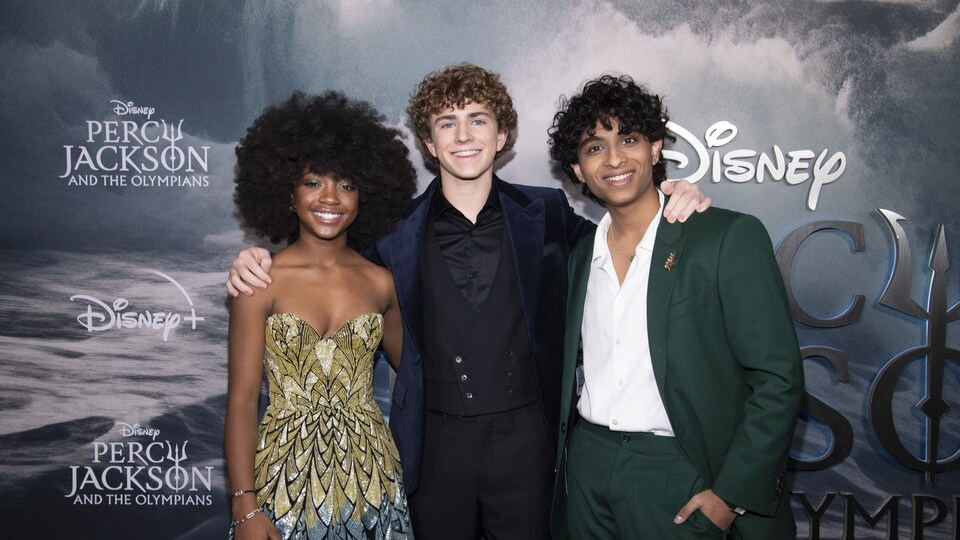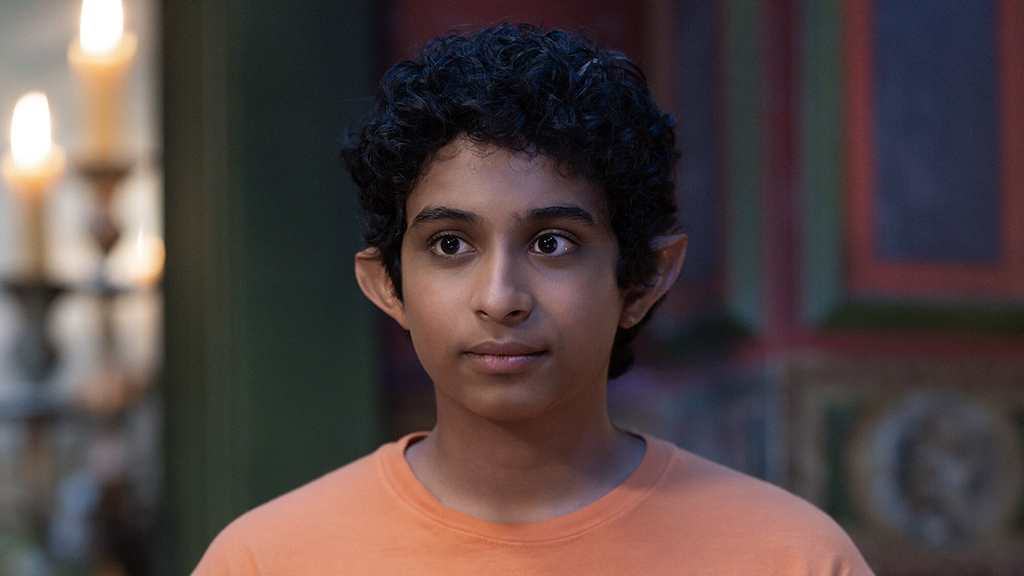By Kai Curry
NORTHWEST ASIAN WEEKLY
The gods and goddesses of ancient Greece. For some reason, their stories never cease to entertain us. Every iteration brings some new revelation not only about them but also about us. They are made in our image, so they are like us—they demonstrate anger, jealousy, pride, excellence. Unlike us, they never express pure love or altruism. But they do give gifts.
At the start of “Percy Jackson and the Olympians,” a Disney+ series to add to the franchise started by Rick Riordan’s books, a teacher (Glynn Turman) who we later learn is Chiron, famous centaur mentor of heroes, introduces his students to these gods.
 “What you see here, they are not fictions. They are not fantasies. What you see here are the truest and deepest parts of yourselves…The gods, the monsters, the heroes…are reminders of what we are capable of.”
“What you see here, they are not fictions. They are not fantasies. What you see here are the truest and deepest parts of yourselves…The gods, the monsters, the heroes…are reminders of what we are capable of.”
In other words, good and bad.
In the show, Percy Jackson (Walker Scobell), named after Greek hero and “half-blood” Perseus, famed for battling Medusa, riding Pegasus, and the gifts given to him by Athena, learns that he, too, is a demigod, half-human, half-god. Yep, his mom slept with a god. In modern times. Don’t we wish. They are the first superheroes. They can be just as amazing and just as annoying. Percy, who is sent to “Camp Half-Blood,” doesn’t know who his dad is. His mom didn’t tell him, and as often as not, these immortals do not claim their blood. Percy is forced to flee to the Camp for protection. It’s a sanctuary from mythical forces that want to kill him for reasons. He’s accompanied at first by his mom (Virginia Kull), and throughout by protector companion sidekick, a satyr named Grover Underwood (so he’s related to the Hobbits).
Grover is played by Indian American Aryan Simhadri, a Disney Channel regular for over 10 years in commercials and shows, including the movie “Spin,” which was the first time for Disney that a South Asian was cast as a lead. Grover has a complicated role in “Percy Jackson and the Olympians” because he is on one hand Percy’s friend but on the other hand a tool of the Olympians. And on the third hand (sure, why not), Grover has his own heritage as the descendant of a “Searcher,” satyrs looking for the disappeared Nature god, Pan (this is the explanation for why humans have been allowed to destroy the Earth; Pan is MIA). Grover joins Percy and “Annabeth” (Leah Sava Jeffries) in a quest that takes them across the U.S. The world is in two layers—the muggle and the mythical. Olympus, for example, is on top of a high rise in New York City (I know, I had no idea); Hades is underneath Los Angeles (seems like a bit of an insult, but whatever); and the St. Louis arch is a temple to Athena (that was kinda cool, actually).

From left: Leah Sava Jeffries, Walker Scobell, and Aryan Simhadri at the world premiere. Photo courtesy of Disney+ (Disney Branded Television and 20th Television).
Grover is “the soul of the group,” according to Simhadri in an interview with the Asian Weekly. He’s empathetic and conscientious, which is “helpful,” Simhadri commented, when “you’re dealing with people like Percy and Annabeth who never say outright what they’re feeling.” Percy and Annabeth are hotheads, and they have a hard time trusting each other, as we come to find out their god parents are traditional rivals and have some beef. Grover is relatively mild-mannered but does get fed up with them in time. “He helps ground Percy and Annabeth as they get accustomed to this world…he kind of helps center the quest and keep it on track.” That’s a big role as the quest would pretty much go sideways if Grover wasn’t there.
The cast in general is fairly diverse and, to me, represented an effort on Riordan’s part to route for the outcast. Unlike at school, where Percy was bullied for having, gasp, an imagination, at Camp Half-Blood, newfound friend Luke (Charlie Bushnell) tells him that now, what Percy thought was not normal—and Luke lists having nightmares, daydreaming, having ADHD, and having dyslexia—is normal here:
“For the first time in your life, you’re just like everyone else.”
There are a lot of attempts in the series to mind bend as far as what our societal norms are, which is awesome, but I found that it often went in whatever direction was needed to serve the story at that moment. For instance, we are told by Percy’s mom that “not everyone who looks like a hero is a hero and not everyone who looks like a monster is a monster.” She didn’t name him Perseus because Perseus was a hero (I know, weird, right?) but because of the quality time baby Perseus shared with mom inside a wooden chest when their human dad tried to kill them. They “braved the storm,” she says, that was “made to break us” and “and against all odds,” Perseus managed to “find his way to a happy ending.” It’s inspiring and definitely a new take.
Based on this lesson from his mother, when Percy meets Medusa (and I don’t understand how she is alive? She got her head cut off already by the first Percy?), he is quick to chasten his companions that maybe she’s not a monster—they should give her some benefit of the doubt. But…she is. Yeah. Actually, she still is. Or when we meet the “Mother of Monsters,” Echidna (yep, like those poisonous bastards in “The Witcher” game, but she’s much better looking, at least in human form), she proposes an alternative history that she’s protecting her world against them—freakish demigod nuisances who in Echidna’s words are “dangerous” and “disruptive.”
It’s Grover’s job to break these kinds of things to Percy: that it’s hard to figure out where we stand in a world of contradictions and deception. Who is on your side? Who isn’t?
“That’s such an insane thing to put on a 12-year-old who recently got kicked out of boarding school,” Simhadri commented to the Asian Weekly. It was important to Simhadri to emulate in this series the “natural chemistry” he saw in the “Percy Jackson” movie between the adventurers. “It’s a lot to live up to, especially coming off of the book series as well, and we wanted to make it our own.”

Aryan Simhadri as Grover, friend and protector of Percy. Photo courtesy of Disney+ (Disney Branded Television and 20th Television).
They have.
“Percy Jackson and the Olympians” may be a follow up to already existing stories, both modern and ancient, yet it fully manages to make this story fresh and fun. There’s humor (Medusa’s “garden gnome emporium” of stone statues) and even though the logic is a bit wobbly at times, and some of the themes laid on a bit thick (such as the mistreatment of women which is, nonetheless, a routine part of Greek god behavior that definitely deserves more attention), there’s a lot of food for thought that is served in a way palatable for both adults and teenagers.
“I’m used to feeling weird. I’m used to the world feeling weird,” says Percy. “Like a puzzle with half the wrong pieces.” Which can be very relatable. And the response, which Percy receives when he finds others like himself—“You are not broken”—is something we all would like to hear.
Kai can be reached at info@nwasianweekly.com.




“Percy Jackson and the Olympians brilliantly breathes life into Greek mythology, skillfully blending ancient tales with a modern twist. The series not only captivates with its adventurous narrative but also champions diversity, making it a compelling read for all. Speaking of unique experiences, for an exciting diversion, check out this informative link on Plinko casino games at https://notgamstop.com/mini-games/plinko/ , providing valuable insights for players seeking a thrilling and rewarding gaming experience.”